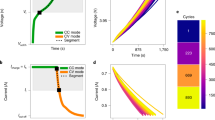Abstract
In different fields, such as electric mobility, the increasing use of small consumer electronics devices, and the development of renewable energy alternatives, energy storage systems have become crucial to technological advancement. Batteries are among the most frequently used techniques for storing electrical energy. However, it is essential to be aware of the operating status of their load cells to achieve proper and secure operation. This study compares the efficacy of various supervised classification techniques for categorizing the operating status of a Lithium Iron Phosphate - LiFePO4 (LFP) load cell using voltage values obtained from the battery. Each method was assessed using a real dataset, and excellent results were achieved, with accuracy values of up to 90%.
Access this chapter
Tax calculation will be finalised at checkout
Purchases are for personal use only
Similar content being viewed by others
References
Breiman, L.: Random forests. Mach. Learn. 45(1), 5–32 (2001). https://doi.org/10.1023/A:1010933404324/METRICS, https://link.springer.com/article/10.1023/A:1010933404324
López, V., et al.: Intelligent model for power cells state of charge forecasting in EV. Processes 10(7), 1406 (2022)
Calvo-Rolle, J.L., Quintian-Pardo, H., Corchado, E., del Carmen Meizoso-López, M., García, R.F.: Simplified method based on an intelligent model to obtain the extinction angle of the current for a single-phase half wave controlled rectifier with resistive and inductive load. J. Appl. Log. 13(1), 37–47 (2015)
Cortes, C., Vapnik, V., Saitta, L.: Support-vector networks. Mach. Learn. 20(3), 273–297 (1995). https://doi.org/10.1007/BF00994018, https://link.springer.com/article/10.1007/BF00994018
Energy, R.: Powering up: Global battery demand to surge by 2030, supply headaches on the horizon (2022)
Fernandez-Serantes, L., Casteleiro-Roca, J., Calvo-Rolle, J.: Hybrid intelligent system for a half-bridge converter control and soft switching ensurement. Revista Iberoamericana de Automática e Informática industrial (2022)
Fix, E., Hodges, J.L.: Discriminatory analysis - nonparametric discrimination: consistency properties. Int. Stat. Rev. 57(3), 238 (1989). https://doi.org/10.2307/1403797
Jove, E., Casteleiro-Roca, J.L., Quintián, H., Zayas-Gato, F., Vercelli, G., Calvo-Rolle, J.L.: A one-class classifier based on a hybrid topology to detect faults in power cells. Logic J. IGPL 30(4), 679–694 (2022)
LiFeBATT: Lifebatt x–1p 8ah 38123 cell. http://www.solarvan.co.uk/Life/LiFeBATT8Ah.pdf
Martin, G., Rentsch, L., Höck, M., Bertau, M.: Lithium market research-global supply, future demand and price development. Energy Storage Mater. 6, 171–179 (2017)
Martins, L.S., Guimarães, L.F., Junior, A.B.B., Tenório, J.A.S., Espinosa, D.C.R.: Electric car battery: an overview on global demand, recycling and future approaches towards sustainability. J. Environ. Manage. 295, 113,091 (2021)
Michelena, A., Zayas-Gato, F., Jove, E., Fontenla-Romero, O., Calvo-Rolle, J.L.: Comparative study of anomaly detection techniques for monitoring lithium iron phosphate-lifepo4 batteries. In: Proceedings of V XoveTIC Conference. XoveTIC, vol. 14, pp. 80–82 (2023)
Porras, S., Jove, E., Baruque, B., Calvo-Rolle, J.L.: A comparative analysis of intelligent techniques to predict energy generated by a small wind turbine from atmospheric variables. Logic J. IGPL (2022). https://doi.org/10.1093/jigpal/jzac031
Rasmussen, C.E., Williams, C.K.I.: Gaussian Processes for Machine Learning. Gaussian Processes for Machine Learning (2005). https://doi.org/10.7551/MITPRESS/3206.001.0001, https://direct.mit.edu/books/book/2320/Gaussian-Processes-for-Machine-Learning
Rumelhart, D.E., Hinton, G.E., Williams, R.J.: Learning representations by back-propagating errors. Nature 323(6088), 533–536 (1986). https://doi.org/10.1038/323533A0
Stampatori, D., Raimondi, P.P., Noussan, M.: Li-ion batteries: a review of a key technology for transport decarbonization. Energies 13(10), 2638 (2020)
Xu, C., Dai, Q., Gaines, L., Hu, M., Tukker, A., Steubing, B.: Future material demand for automotive lithium-based batteries. Commun. Mater. 1(1), 99 (2020)
Zayas-Gato, F., et al.: Intelligent model for active power prediction of a small wind turbine. Logic J. IGPL (2022). https://doi.org/10.1093/jigpal/jzac040
Zayas-Gato, F., et al.: A distributed topology for identifying anomalies in an industrial environment. Neural Comput. Appl. 34(23), 20463–20476 (2022). https://doi.org/10.1007/s00521-022-07106-7, https://link.springer.com/10.1007/s00521-022-07106-7
Zayas-Gato, F., Michelena, Quintián, H., Jove, E., Casteleiro-Roca, J.L., Leitão, P., Luis Calvo-Rolle, J.: A novel method for anomaly detection using beta Hebbian learning and principal component analysis. Logic J. IGPL 31(2), 390–399 (2022). https://doi.org/10.1093/jigpal/jzac026
Zayas-Gato, F., et al.: A novel method for anomaly detection using beta hebbian learning and principal component analysis. Logic J. IGPL 31(2), 390–399 (2023). https://doi.org/10.1093/jigpal/jzac026, https://academic.oup.com/jigpal/article/31/2/390/6532160
Acknowledgement
Álvaro Michelena’s research was supported by the Spanish Ministry of Universities (https://www.universidades.gob.es/), under the “Formación de Profesorado Universitario” grant with reference FPU21/00932.
Míriam Timiraos’s research was supported by the “Xunta de Galicia” (Regional Government of Galicia) through grants to industrial PhD (http://gain.xunta.gal/), under the “Doutoramento Industrial 2022” grant with reference: 04_IN606D_2022_2692965.
CITIC, as a Research Center of the University System of Galicia, is funded by Consellería de Educación, Universidade e Formación Profesional of the Xunta de Galicia through the European Regional Development Fund (ERDF) and the Secretaría Xeral de Universidades (Ref. ED431G 2019/01).
Author information
Authors and Affiliations
Corresponding author
Editor information
Editors and Affiliations
Rights and permissions
Copyright information
© 2023 The Author(s), under exclusive license to Springer Nature Switzerland AG
About this paper
Cite this paper
Michelena, Á. et al. (2023). Machine Learning Based System for Detecting Battery State-of-Health. In: García Bringas, P., et al. 18th International Conference on Soft Computing Models in Industrial and Environmental Applications (SOCO 2023). SOCO 2023. Lecture Notes in Networks and Systems, vol 749. Springer, Cham. https://doi.org/10.1007/978-3-031-42529-5_16
Download citation
DOI: https://doi.org/10.1007/978-3-031-42529-5_16
Published:
Publisher Name: Springer, Cham
Print ISBN: 978-3-031-42528-8
Online ISBN: 978-3-031-42529-5
eBook Packages: Intelligent Technologies and RoboticsIntelligent Technologies and Robotics (R0)




